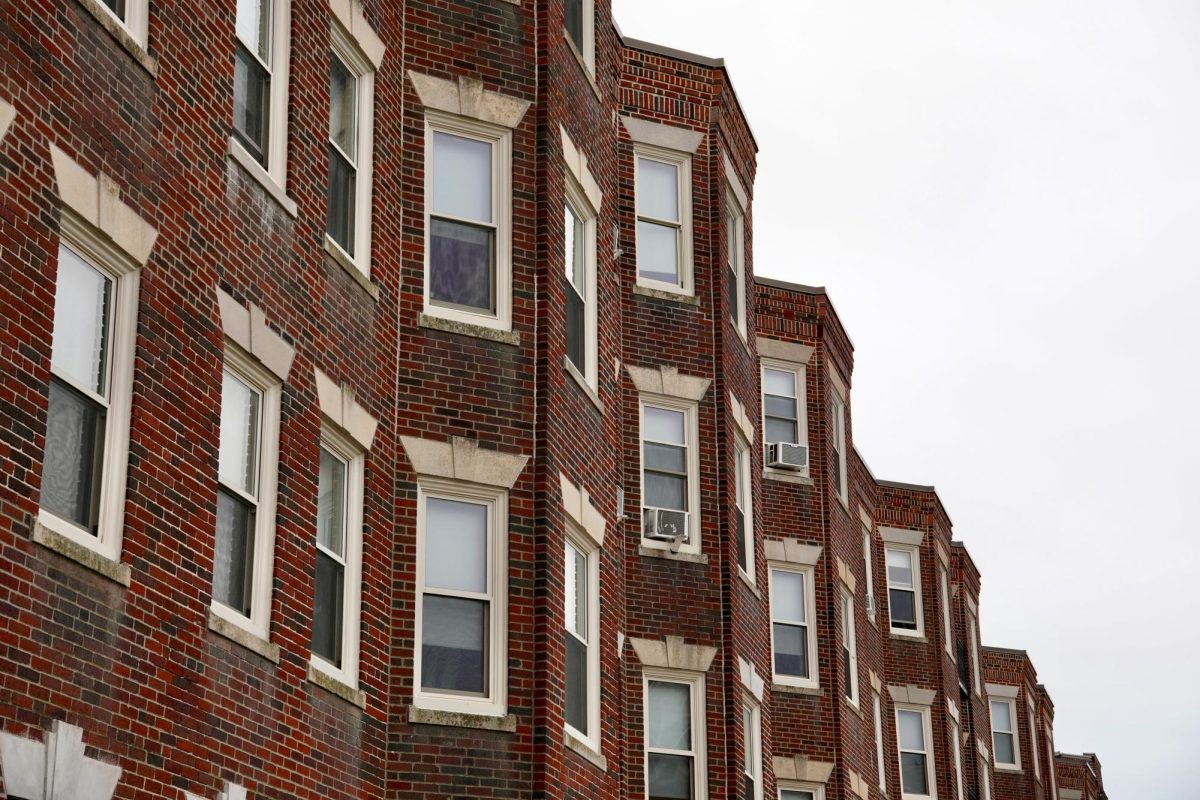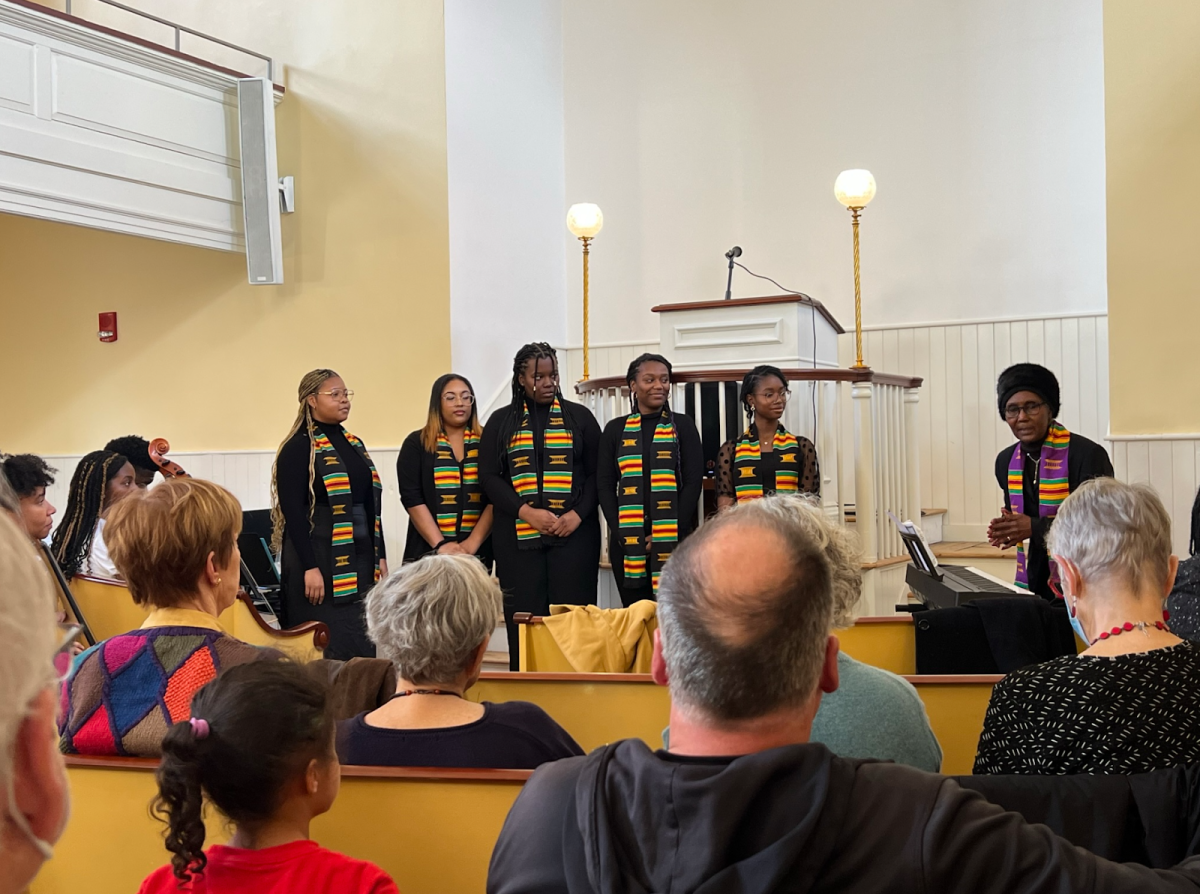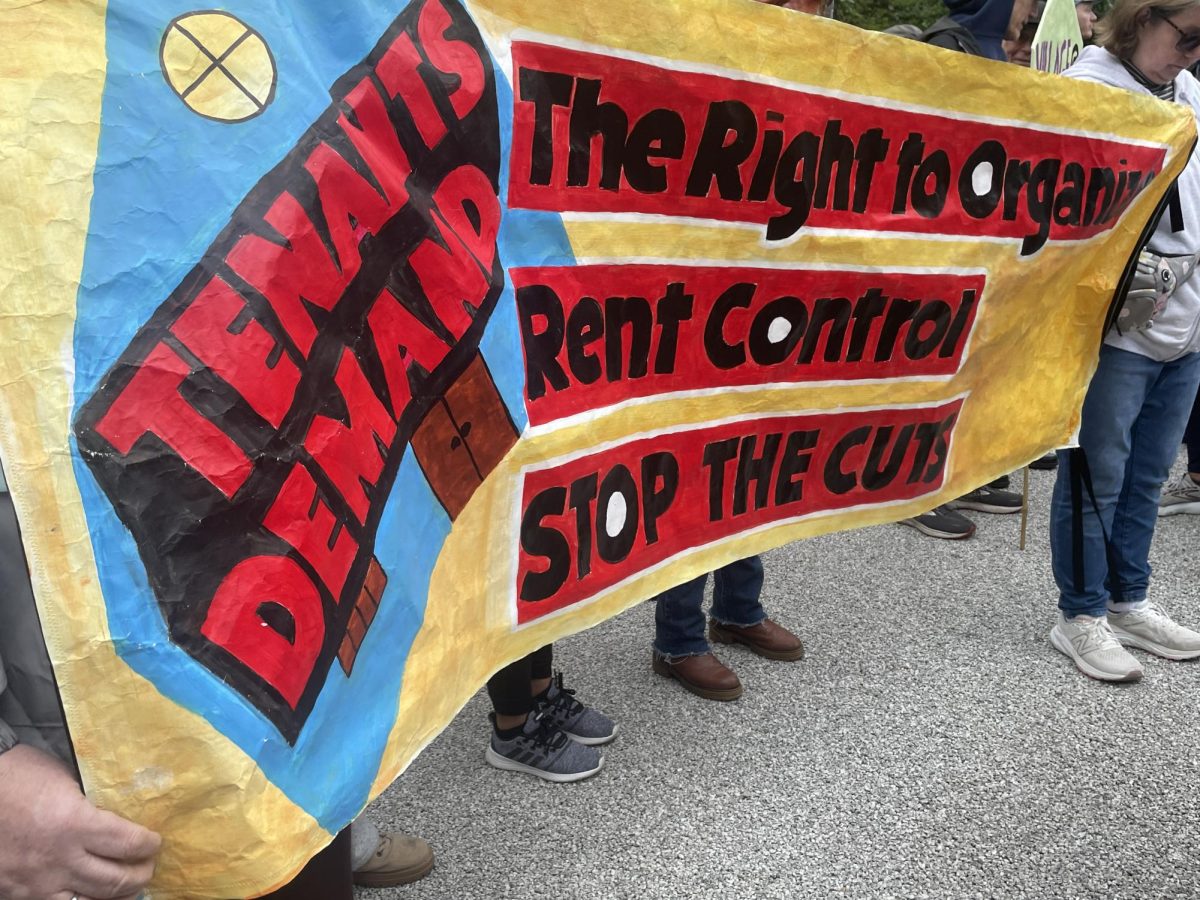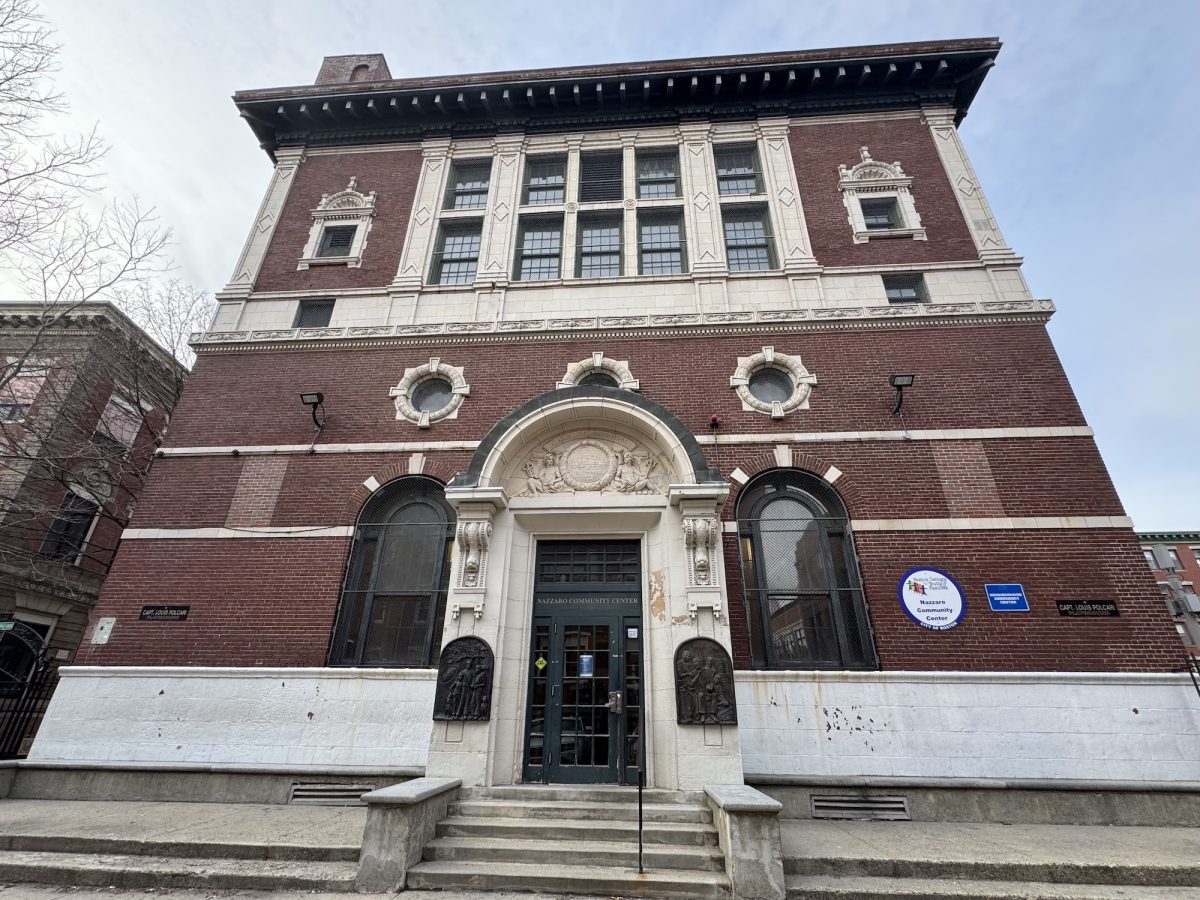The speakers in Hearing Room B-2 of the Massachusetts State House turn their attention to the screen for online attendees. For over an hour on this chilly Monday afternoon – Nov. 13, 2023 – they have been giving oral testimonies. Chair Jay D. Livingstone calls the next speaker.
“First is Jennifer Msumba.” What follows is an emotionally striking call to action that represents half a century of advocacy against one institution. Msumba is clearly nervous, but that doesn’t stop her from being self-aware and self-accepting in her testimony.
The Judge Rotenberg Educational Center has been the focal point of fierce controversy since it was founded in 1971. Discussing the Rotenberg Center is deeply personal for most speakers here today, but it is especially so for Msumba. She was a resident from 2002 to 2009, and she left with memories she would prefer to forget.
“Why do I care, you might ask? I’m not there anymore, [but] I’m still afraid.” said Msumba in her testimony.
A day and residential school in Canton, the center’s website states that it has “provided very effective education and treatment to both emotionally disturbed students with conduct, behavior, emotional, and/or psychiatric problems, as well as those with intellectual disabilities or on the autism spectrum.” It’s the methods behind this treatment that are the source of the controversy.
For decades, the center has used a range of aversive therapies, which provide negative reinforcement, to regulate and modify the behavior of its residents. The most infamous aversive used is the “graduated electronic decelerator,” or GED. The device, which attaches to residents’ arms or legs, is remotely controlled by staff who can administer electric shocks whenever a resident misbehaves. Diagnosed on the autism spectrum, these shocks were used on Msumba to control her self-injurious behaviors, which she fully admits to having.
“While I was there and on the GED, I was terrified, on high alert, constant anxiety, sick to my stomach, couldn’t eat, couldn’t sleep.”
In her testimony, Msumba also addressed the excessive use of electric shocks and various other aversives in response to nonviolent behaviors of hers.
“I was shocked in my sleep for things I did not do, accidental misfires and worst of all, staff abuse of the device,” said Msumba. “I was shocked for body tics, which I cannot control, and things like waving my hands in front of my face and crying. I was one of those stripped of all my clothes, tied to a restraint board and forcefully scrubbed while male staff watched on the video monitors. I did not consent to any of this treatment.”
This is all in her past, and she’s getting the help she needs now. At her new placement, Msumba is taught how to self-regulate and is given access to the medication she needs. There’s a focus on helping her cope with her behaviors rather than trying in vain to extinguish them. It’s a story of personal triumph, but the trauma from the Rotenberg Center still haunts her. Even now, she needs therapy for her PTSD.
“I have had nightmares for 14 years every night. I wake up screaming ‘No, stop!’”
Msumba is far from alone both in her experiences and her hopes. In 2013, the center was condemned by the United Nations Special Rapporteur on Torture. The Autistic Self Advocacy Network, or ASAN, has launched a movement called #StopTheShock, which seeks to end this mistreatment. Through this movement, bills have been brought before both Massachusetts and New York legislatures.
Matthew Israel, who founded the Rotenberg Center in 1971, first studied behaviorism under B.F. Skinner and was heavily influenced by his novel, “Walden Two.” The GED is a device of Israel’s own invention. Putting an end to its use is the mission of Massachusetts Bill H.180, which Msumba supports in her testimony.
The device was once banned by the FDA, only for a federal court to overturn the ban a year later after deciding that it was not within the FDA’s power to issue it.
Regardless of widespread disapproval, use of the device has been upheld as recently as September 2023. For disability advocates like those at ASAN, the fact that their use is still permitted is baffling.
“How would you feel if you were in this situation, or your child?” asked Msumba in her testimony. “No one’s safe if this continues.” And yet, despite the passionate testimony of Msumba and others, supporters of the device continue to be vocal.
Four bills were under discussion Nov. 13, and three of them were sparked by the actions of the Rotenberg Center. Bills H.170 and S.81 would require the Rotenberg Center to obtain a license to use the device. While this may seem like a move against the shock method, it really means that while the bill stands, the center would be protected from further attempts to ban the device, so long as they obtain a legal license. Like Msumba, many of the residents living at the center have severe self-injurious behaviors. Others have displayed violent and aggressive behaviors towards their families. Those who advocated for Bills H.170 and S.81 cited eliminating these behaviors as their reason for supporting the GED. Some staunch proponents of the device feel its use should be continued even without the requirement of a license.
“For this population, the GED can be an extraordinary treatment,” said Dr. Nathan Blenkush, the clinical director at the Rotenberg Center, in his Nov. 13 testimony. “After this treatment is approved, the restraints end, the behaviors are reduced, sometimes by 97, 98, almost 100 percent reduction in the frequencies of the behaviors. The patients are receiving less than one skin shock per week on average.”
Blenkush opposed all three bills regarding the center in his testimony.
Despite Blenkush’s claim that shocks are given in moderation, there have been numerous reported incidents at the Rotenberg Center that show otherwise. In 2002, 18-year-old Andre McCollins was tied to a four-point restraint board and shocked 31 times. This response did not follow violent behavior. McCollins was shocked once for refusing to take off his jacket, then 30 more times for tensing up in response to the painful shocks. In New York, where Andre and the majority of the residents at the Rotenberg Center are from, advocates are working to get Senate Bill S900 and Assembly Bill A.1166, the state’s equivalents of Bill H.180, passed. The bills are collectively known as Andre’s Law.
Incidents like what McCollins experienced only scratch the surface of the Rotenberg Center’s extreme methods. Since the center opened, six people have died in preventable incidents caused by aversives or neglect. In 1985, 22-year-old Vincent Milletich died of asphyxiation after having an epileptic seizure while being forced to wear a sensory deprivation helmet. Five years later, 19-year-old Linda Cornelison died of complications caused by a stomach ulcer after being placed on a program where food was withheld from her as punishment for misbehavior.
These aversives are the center’s approach to a wider behavioral therapy called applied behavior analysis, or ABA. The therapy, which is specifically used with people on the autism spectrum, is controversial in its own right. Essentially, it relies on positive and negative reinforcement for good and bad behaviors. While modern ABA typically focuses more on rewards, critics argue that the treatment is based on repetition and eliminating negative behaviors rather than helping people build the skills necessary to navigate the world.
“The issue might not be in ABA itself but in how it is done,” said Sam Farmer, a neurodiversity self-advocate, author and public speaker. “Any therapeutic method can either be done in a neurodiverse-affirming fashion or not… but I’m going to avoid generalizing all of it as being negative because from what I have learned, there are better, more humane ways of doing ABA.”
Stories like Msumba’s fuel advocacy for H.180 and against aversives like the GED or food and sensory deprivation. Because the shock device is specific to the Rotenberg Center, however, advocacy groups believe that ending its use is the first step towards a broader removal of aversives.
Those against the GED also note that the Rotenberg Center is the only institution that considers the device’s use to be necessary.
“There are people with the same level of needs and issues all over the country being served in different settings with different methods, not with torture,” notes Zoe Gross, the director of advocacy at ASAN. “So there are people that can be served in other ways, and we know that there are alternatives.”
Gross is among the many advocates who consider the Rotenberg Center’s methods to be acts of abuse Despite the hotly contested ethics of aversives, the center remains insistent on their use, bolstered by parents who feel there is no other way to help their children.
Louisa Goldberg’s son Andrew has been at the Rotenberg Center for 22 years. In her testimony, Goldberg explained how shocks were the only effective solution to controlling her son’s “aggressive outbursts.”
“The two-second skin shock has broken the cycle of his aggression. He is now awake, he’s alert, he jokes with the staff and best of all, nobody is afraid of him,” said Goldberg.
This perspective has upheld the device’s use for decades, but in recent years, a rift has started to form. Between an uptick in self-advocacy against aversives and the publication of an eye-opening book, the tide of controversy is starting to turn.
In 2021, Jan Nisbet’s book, Pain and Shock in America: Politics, Advocacy, and the Controversial Treatment of People with Disabilities, was published. It’s deeply comprehensive and the first of its kind, covering 50 years of the Rotenberg Center’s history, methods and controversy. Nisbet, a professor emeritus at the University of New Hampshire, knows more about the center than almost anyone. Her involvement with disability advocacy goes back decades, and her wealth of knowledge has recently paid off in new ways.
Nisbet has always been staunchly against the center’s practices, and Pain and Shock in America is a product of passion as well as research. All the same, telling the stories of residents seemed an impossible task at times. She still remembers when a stack of musty old boxes was left anonymously at her door. The photographs inside of heavily bruised residents were impossible to unsee. The hardest part for her was reading the coroner’s reports for residents who died.
“People had been subjected to food starvation, to white noise, to horrific punishment, and the coroner’s report always said that this was because they had a disability, not because of the practices,” said Nisbet.
Despite this, she senses that change is brewing with a wave of emerging self-advocates, and she is more hopeful now than ever.
“I think it was Jennifer Msumba’s letter to the FDA and her testimony that I think really made a difference,” said Nisbet. “It used to be professional against professional. It used to be parents against parents… but [with] the voice of people with disabilities who have experienced these practices, you’re not taking sides, you’re hearing the story.”
For the courts, these are stories being told first hand for the first time. Self-advocacy lets people with disabilities prove that they are capable of standing up for their rights. Msumba has in many ways become the face of this new chapter in self-advocacy. Beyond her letters and testimonies, she has established herself as a songwriter and author, using her
platforms to highlight and celebrate her neurodivergence. On Aug. 24, Msumba performed at Fenway Park for STARS of the Spectrum, a 25th anniversary concert for the Doug Flutie Jr. Foundation for Autism.
“Years ago, when I left Boston, my doctors were not optimistic about my future,” said Msumba before performing “The Boston Song,” which she wrote herself. “But now I’m back, and I’m on this stage.”
In a sense, the short dedication Msumba gave before the song represents her and so many other self-advocates’ efforts.
“This is for everyone who’s ever been underestimated.”














